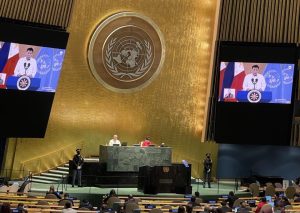On September 22, Philippine President Rodrigo Duterte addressed the United Nations General Assembly during its 76th session as a leader condemning global injustice while committing himself to pursue governance reforms.
He talked mainly about the hoarding of vaccines by rich nations, the lack of concrete and sustained action to address the climate crisis, the danger of foreign interference in countries dealing with “complex problems,” and the obsolete mechanisms of the U.N.
Duterte might have appeared convincing at first because he was right on the mark in calling out the actions of rich countries that have led to the alarming disparity of vaccine distribution in the world. He was also correct in highlighting the accountability of developed nations in the slow rollout of reforms that will supposedly reduce their carbon emissions.
But for those who are familiar with what has happened in the Philippines over the past five years, Duterte’s U.N. speech sounded comical, if not tragic, due to the failure of the Filipino leader to “walk his talk.”
Duterte railed against the unjust procurement of COVID-19 vaccines by rich nations when his own government was accused of smuggling these goods for the benefit of his security team and other high-ranking officials.
He feigned concern for the unequal pandemic response that hurt the poor yet an ongoing Senate probe has exposed how funds intended to deal with the COVID-19 crisis were awarded to companies and cronies with alleged links to the president. Duterte’s subordinates were accused too of ordering overpriced medical items even if the president has pledged to wipe out corruption in the bureaucracy.
Duterte’s claim that his government has fulfilled its commitment to prioritize climate action was contradicted by the recent release of a Global Witness report naming the Philippines as among the countries with the highest number of environment-related killings. Land rights advocates and climate activists have faced persecution because of their opposition to Duterte-approved projects that threaten rights and biodiversity. Duterte also reversed the previous ban on mining and other extractive activities, which will certainly weaken the country’s resilience to climate disasters.
Most news reports focused on Duterte’s statement promising to review how the police conducted the government’s notorious “war on drugs,” which has led to thousands of extrajudicial killings. But at the same time, he hinted his rejection of the efforts of the International Criminal Court to probe the excesses committed by state forces.
“Meaningful change, to be enduring, must come from within. The imposition of one’s will over another – no matter how noble the intent – has never worked in the past. And it never will in the future,” Duterte said.
He was also insistent that his program was successful.
“In dealing with complex problems in nation-building, let us consider pragmatic approaches that square ideals with reality. Sure, they may lead us to imperfect solutions – but solutions, nonetheless, that actually work.”
This is a blatant lie since the anti-drug campaign has failed, as Duterte himself has admitted on several occasions.
Duterte has been consistent at the U.N. in refusing blame for the drug killings. It was also during his address at the U.N. last year when he accused “interest groups” of “weaponizing” human rights to discredit his presidency. “They hide their misdeeds under the blanket of human rights but the blood oozes through,” he said.
It is ironic that in the past two years, Duterte has used the U.N. as a platform to deny the human rights atrocities that took place during his term, in the same week that the nation is commemorating the Martial Law declaration of 1972. The coincidence is jarring since the implementers of Martial Law were the same state forces today accused of killing drug suspects with impunity.
But Duterte’s U.N. speech this year was not widely talked about in the Philippines. It could be that Filipinos were more interested in the Senate hearings on corruption, the surge of COVID-19 cases, or news about presidential candidates. Or maybe many are already unsure if the U.N. speech reflects Duterte’s real sentiment given his penchant for revising his remarks.
Perhaps it’s also a good thing, since Duterte’s offer of assistance to Rohingya and Afghan refugees could have provoked an intense response from some segments of the population. This also summed up the sincerity of Duterte’s U.N. speech: a president extending aid to refugees in other countries yet oblivious to the situation of internally displaced persons who fled their homes because of the government’s Martial Law declaration in Mindanao and its all-out-war against the communist movement in various parts of the country.

































